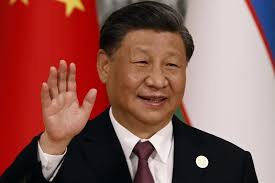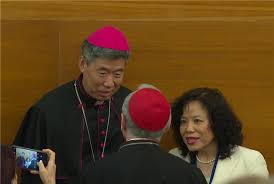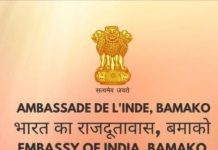Since the US and the UK are predominantly Protestant, the growing understanding between the Vatican and Beijing could lead to closer ties between the West and China., and reduce the US-led West’s resistance to China’s rising influence.Gopal Misra

Chinese President Xi Jinping, since being elevated to lead China more than a decade ago, has successfully been implementing strategies and policies for enabling his country to attain a superpower status. In other words, he is trying to accommodate other nationalities other than the Hans, and religious groups in the Chinese nation.
For this, Xi Jinping has adopted the pragmatic policies of Deng Xiaoping, the successor of Mao Zedong, while keeping dictatorial control of the founder of the communist government in the country.
It may be recalled that during his tenure 1978-79, Deng Xiaoping, as China’s paramount leader, had introduced the market economy. Interestingly, the Chinese Communists, who had branded Nikita Khurshev a revisionist, introduced repressive systems depriving working classes of their legitimate rights being enjoyed by their counterparts in the West. During the past four decades, China has become a coveted destination of the Western capitalists for setting up their industrial units. It offers a competent trained workforce by paying a pittance of the wages they had to cough up to their industrial workers. Even by paying unemployment allowance to their people, it is much cheaper and hassle free for the West to use China as their manufacturing base for the world markets
The ruling elite in China comprising the leaders of the Communist Party of China (CPC) and the People’s Liberation Army (PLA) have also immensely benefited from the Western capital and the influx of the state-of -the art technology. The young generation, which has been fed with the ideology of the supremacy of China for years, is now being told that China is at the threshold of becoming a Superpower.
Religious tolerance
XI Jinping has to be admired for converting his country’s market economy into a strong asset for attaining the Chinese dream to become a Superpower. He has also proved his political skills in camouflaging Deng’s bid to open up the country’s financial systems as the socialist-market economy. His decision to give some breathing space to the Christians is a part of his strategy to win the world’s most popular faith to serve the Chinese agenda of extending its influence across the continents.
Over the past two decades, the Chinese have also permeated Western institutions, including the media, academia, and political bodies. In recent years, they have been recognised as outstanding achievers, whether in the fields of basic sciences or advanced technologies. Interestingly, all this is being done without introducing multiparty democracy, free press and media and independent judiciary. These institutions have been the cornerstone of the modernization of Europe having deep religious foundations. Jinping is being admired for blending the policies of the two leaders, Mao Zedong and Deng. He has evolved a powerful system of a totalitarian state, while serving China’s long-term as well as immediate agenda.
The winning of the Christians to his side confirms his agenda in recent years reconfirms his agenda to use religion for his strategic purposes. For example, China has deep relaxation with the Muslim world despite the repression unleashed against Uighur Muslims in its eastern region.
For Indians, both Islam and Christianity have blossomed together with her traditional religions, Hinduism and Jainism and Buddhism. In India, the Christianity had arrived on the Malabar coast, when the ship of St. Thomas docked in 52 AD, but in China, Christianity was introduced during the incursions of the colonial powers during the 17th century. In Mangolia, however, the Vatican had sent missionaries in the 13tn century, to prevent the growing influence of Islam, especially during the wars between the Cross and the Crescent; but the missionaries failed miserably.
The recent cooperation between Beijing and the Vatican needs to be understood in the context of geo-politics. The Chinese agenda is to end the last citadel of the West i.e. it’s strong religious traditions. If the Chinese succeed in penetrating this traditional inbuilt resistance, the developed Christian world would collapse like the Mughal Empire in Delhi, and the East India Company ruled the country for almost a century till the 1857 uprising, while retaining the Mughal crown only for a namesake.
The Shanghai Conference
Few in India have ever cared to study the role of the Christian missionaries in the renaissance of modern China. The modernization of Chinese politics began during the era of Sun Yat-sen, who was baptized in the Protestant cult. Since the US and the UK are mostly Protestant, the growing understanding between the Vatican and Beijing might further bring closer ties between the West and China. It is expected to end the resistance of the US -led West against the growing might of China. There may be differences regarding the secret pact between Beijing and Vatican, but its political spin offs give a much more acceptable image of China in the countries of Europe, Africa and Latin America. The majority population in these countries is Roman Catholic.

For the Vatican, the Bishops conference held in Shanghai in May this year, XI Jinping has become one of the world’s most noted religious congregations in recent years. It was attended by Cardinal Petro, foreign minister of the Vatican and a number of known religious leaders.
The Pope’s endorsement of Shan as the Bishop, an appointee of Beijing, however, has triggered off a worldwide controversy. The appointment of Bishops has always been the prerogative of the Vatican. A section of the followers of the Catholic cult is also reportedly unhappy that Pope Francis inaugurated the conference, though on video, has legitimized the appointment. For many, it is going to be an important milestone in the history of the Christianity. It is for the first time in recent history that the Vatican has accepted a Bishop without its previous clearance.
Renaissance in China
It was K.R. Narayanan, who later became President of India, had first explained to this author about the great awakening in China under the influence of the missionaries. His thorough studies on world affairs has always been inspiring to scribes like Narayan and his wife, Usha (Burmese name Maa Tint Tint), a YWCA volunteer, had a common world view. They were inspired by the famous political scientist, Herold Laski.
Narayanan, an eminent scholar of the London School of Economics and a favorite of Laski, was inducted in the Indian Foreign Service on Laski’s advice to India’s first Prime Minister, Jawahar Lal Nehru.
With this backdrop, it is natural to assume that the Vatican’s decision to renew its secret pact could be a repeat of the Great Awakening i.e. the revival of Christian missionaries, specially the Protestant cult of Christianity on the founders of modern China. The Protestant missionaries had influenced the transformation of China in the 20th. century.
The Roman Catholic missionaries could not resist the expansion of Islam in Mongolia during the middle ages, but they might be playing a bigger role in the region by collaborating with Beijing.
It is quite discouraging that India’s present ruling elite discourages any serious study on the challenges before the Indian state. In this backdrop, the evolution of an Indian narrative or analysis regarding the ongoing changes in the middle kingdom or China now solely depends upon the Western sources. The Indian policy makers have to realize that it is not possible to understand the current Chinese policies unless we realize the vision of a modern China visualized by Sun Yat-sen.













